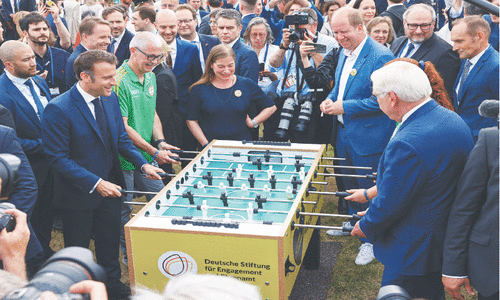AKTAU: The leaders of the five states bordering the resource-rich Caspian Sea signed a landmark deal on Sunday on the legal status of the inland sea which boasts a wealth of oil and gas reserves and sturgeon.
The leaders of Azerbaijan, Iran, Kazakhstan, Russia and Turkmenistan signed the agreement on the status of the inland sea, which has been disputed since the collapse of the Soviet Union rendered obsolete agreements between Tehran and Moscow.
The host, Kazakh President Nursultan Nazarbayev, said before the signing that the leaders were “participants in a historic event”. “We can admit that consensus on the status of the sea was hard to reach and not immediate, the talks lasted more than 20 years and called for a lot of joint efforts from the parties,” Nazarbayev said.
Russian leader Vladimir Putin, whose country was seen as driving the deal, said the convention had “epoch-making significance” and called for more military cooperation between the countries on the Caspian.
Nazarbayev said the convention allows for the construction of underwater oil and gas pipelines as well as setting national quotas for fishing and forbids any foreign military presence.
Iranian President Hassan Rouhani was quick to hail the clause that prevents non-Caspian countries from deploying military forces. “The Caspian Sea only belongs to the Caspian states,” he said.
Putin also praised this clause, saying it would help “ensure the peaceful status of the Caspian Sea”.

National boundaries
The deal provides a means of delimiting national boundaries in the sea whose underground energy resources are estimated at 50 billion barrels of oil and just under 300 trillion cubic feet (8.4 trillion cubic metres) of natural gas.
But Rouhani stressed several times during the summit that these boundaries still need to be worked out between the countries.
Iran, which ended up with the smallest share of the sea under the terms of the convention, is viewed as a potential loser in the deal.
Sunday’s summit was the fifth of its kind since 2002 but there have been more than 50 lower-level meetings since the Soviet breakup spawned four new countries on the shores of the Caspian.
The deal goes some way to settling a long-lasting dispute on whether the Caspian is a sea or a lake — which means it falls under different international laws.
While the convention refers to the Caspian as a sea, provisions in the agreement give it “a special legal status”, Russian deputy foreign minister Grigory Karasin told Kommersant daily earlier this week.
The agreement also offers hope for the Caspian’s ecological diversity and its depleted stocks of the beluga sturgeon, whose eggs are prized globally as caviar.
While it remains to be seen how the deal will be implemented, the summit in Aktau was another opportunity for Moscow to present itself as a diplomatic deal-maker.
After years of unsuccessful negotiations on the Caspian the Kremlin “gains political kudos for breaking a log-jam,” said John Roberts, a non-resident senior fellow at Atlantic Council’s Eurasia Center.
The project is billed as allowing European countries to ease their dependence on gas from Russia at a time of heightened geopolitical confrontation.
Kate Mallinson, Associate Fellow for the Russia and Eurasia Programme at Chatham House, urged caution over the prospects for the pipeline, saying the Aktau deal “is not a legal prerequisite for the construction”. “Neither will a major transport corridor to export Turkmen gas to Europe emerge overnight.”
Published in Dawn, August 13th, 2018













































